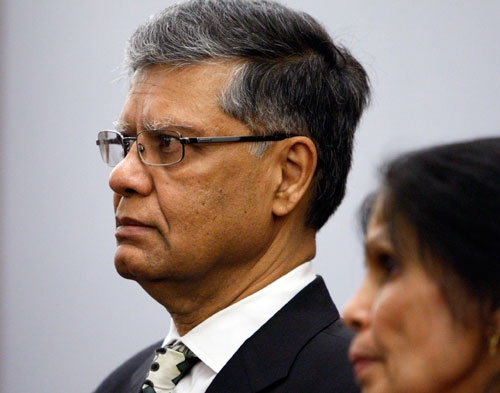D.A. suspects Desai is faking
Accusing Dr. Dipak Desai of faking the seriousness of his health problems, prosecutors filed court papers Wednesday asking for an independent medical examination of the man at the center of Southern Nevada’s hepatitis C outbreak to determine his competency to stand trial.
“It is the state’s belief and position that defendant Desai is malingering and does not possess the level of impairment which might prevent him from understanding and participating in his defense,” Chief Deputy District Attorney Mike Staudaher wrote in his motion. “Defendant Desai has continually tried to hide behind a curtain of mental and physical impairment so he can avoid facing consequences of his actions.”
On Friday, after Desai pleaded not guilty to a 28-count criminal indictment charging him in the 2007 hepatitis C outbreak at his clinics, Staudaher told District Judge Donald Mosley that he wanted to resolve Desai’s competency as early as possible in the case.
Wednesday’s motion represents the opening salvo in what could be a protracted fight over whether the central figure in the potentially deadly outbreak will go before a jury of his peers.
Staudaher said in his papers that he wants all medical records related to the strokes the 60-year-old Desai has claimed to have had, and he wants to choose the physician who would conduct Desai’s independent medical evaluation.
Staudaher also asked Mosley to transfer this aspect of the case to District Judge Jackie Glass, who handles all matters involving the competency of defendants. Mosley has scheduled a June 28 hearing on the prosecutors’ request. Desai’s lawyers will have a chance to respond in writing before then.
Mosley also is set to hold a hearing June 23 on whether to reduce the $500,000 bail of one of Desai’s co-defendants, nurse anesthetist Ronald Lakeman, who was transported to Las Vegas late Tuesday and booked into the Clark County Detention Center. Lakeman, 63, was arrested June 8 in Columbus, Ga., where he lives, and brought back here after waiving extradition.
Desai, Lakeman and the other indicted nurse anesthetist, Keith Mathahs, are facing an array of felony charges, including racketeering, insurance fraud and neglect of patients. Mathahs, 74, is in custody on $500,000 bail. His lawyers are also trying to get his bond reduced.
In his court papers, Staudaher alleged that Desai tried to fake the extent of his illness shortly after health officials publicly disclosed the hepatitis outbreak.
The prosecutor said Desai asked a partner in the now-closed Endoscopy Center of Southern Nevada, Dr. Eladio Carrera, to read a prepared statement at a Feb. 27, 2008, news conference responding to the outbreak. Carrera has since testified under grant of immunity before the grand jury that indicted Desai.
“Dr. Desai told Dr. Carrera that, although he was the medical director and CEO of the clinic, his cardiologist would not allow Dr. Desai to read the prepared statement,” Staudaher wrote. “Dr. Carrera believed that Dr. Desai was being disingenuous and that Dr. Desai looked ‘hale and hardy.’” Staudaher added: “Dr. Carrera did not want to be the lone doctor reading the prepared statement and insisted that Dr. Desai stand by Dr. Carrera as he delivered the statement. Dr. Desai agreed, but just before they were to go to the press conference, Dr. Desai conveniently developed an illness, which prevented him from attending.”
One of Desai’s other former clinic partners, Dr. Clifford Carrol, told prosecutors that Desai was supposed to have been disabled as a result of a stroke in 2007, but he still “was able to manage the office, come in every day and watch everything at the clinic very closely,” Staudaher wrote.
Carrol, who also was given immunity to testify against Desai, indicated that Desai had told the staff he wouldn’t be back running the clinic for about three to six months, but ended up returning after only two weeks, according to Staudaher.
The prosecutor said Carrol testified that Desai “did not appear to have any difficulty speaking, recognizing objects or understanding conversation. In fact, Dr. Carrol said Dr. Desai was lucid, clear and intelligent during that time.”
Carrol believed that Desai had recovered from his stroke and that a subsequent stroke, which was similar in nature, did not cause Desai any major physical impairments, Staudaher wrote.
Staudaher attached to his court papers a list of daily medications Desai’s lawyers say the doctor is taking.
The list includes medications to control Desai’s blood pressure and reduce his cholesterol levels, as well as a blood thinner. He also is taking a magnesium supplement for his heart and vitamins C and E, along with a multivitamin.
District Court spokesman Michael Sommermeyer said that if Glass gets the matter before her, two physicians appointed by the court from a pool of physicians would have to examine Desai.
If both find him competent, the judge likely would hold a hearing to make a formal determination on whether he has the cognitive skills to assist his lawyers at trial, Sommermeyer said.
If Glass then finds him competent, Sommermeyer said, the judge would refer the matter back to Mosley for trial.
If the court-appointed doctors conclude Desai is incompetent, Glass could order additional medical exams to help her make a final determination on whether Desai could be tried on the criminal charges, the spokesman said.
Sommermeyer added that Desai could not stand trial until the judge were to find him competent.
Contact Jeff German at jgerman@reviewjournal.com or 702-380-8135 or read more courts coverage at lvlegalnews.com.


















